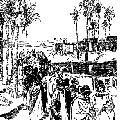06. In a Strange Land
"My sons, and ye the children of ray sons, Jacob your father goes upon his way." —CLOUGH.
For the first seven years after Joseph had been made governor of Egypt, the Nile rose well, and every fifth part of the country's produce was stored up in the granaries of Egypt, and "in all the land of Egypt there was bread." The bad years came. The Nile did not rise, the corn did not grow, and the famished people cried to Pharaoh for bread.
"Go unto Joseph; what he saith to you, do," was Pharaoh's answer to all the clamouring people. And Joseph opened the storehouses of grain and sold to the Egyptians.
Not only was there famine in Egypt, but the famine was "over all the face of the earth." This included the land of Canaan, where Joseph's father and brothers still lived. There came a day, as the famine grew worse and worse, when Jacob called his sons.
"Behold, I have heard that there is corn in Egypt," he said to them: "get you down thither, and buy for us from thence; that we may live, and not die." The ten brothers started off for Egypt to buy corn. They found that the governor was selling the corn in person. He was the great man of the land, and they bowed down themselves before him with their faces to the earth. They little thought that this man to whom every one bowed down was their young brother Joseph, but Joseph recognised his brothers at once. The sight of their familiar faces moved him strangely, and he turned from them in tears. He behaved generously towards them, but he did not tell them who he was. And when they had filled their sacks with corn they went home.
But the famine went on, and again they came, bringing Benjamin, the youngest son, with them this time. They brought Joseph presents too—honey and spices, nuts and almonds. Again they bowed low before him.
"Is your father well, the old man of whom ye spake? Is he yet alive?" were Joseph's eager words when he saw them again. Yet again he turned from them in tears, which they could not understand.
At last he told them who he was—told them simply, weeping and alone, "I am Joseph your brother, whom ye sold into Egypt." Then he informed them that he was lord of Pharaoh's house, and a ruler throughout all the land of Egypt. "And ye shall tell my father of all my glory in Egypt, and of all that ye have seen; and ye shall haste and bring down my father hither." So the brothers journeyed back into Canaan, laden with good things from Egypt, to tell their father the good news.
"It is enough," said the old man; "Joseph my son is yet alive: I will go and see him before I die." And Jacob left his old home, and he took his sons and his grandsons, and all their wives and children, his cattle and all his goods. It must have been a long line of camels and asses, together with the waggons that Pharaoh had sent from Egypt, that crossed the burning desert, to go down into Egypt. And Joseph drove out in his chariot to meet his father, and he fell on his neck and wept a good while." Joseph brought his father into the presence of the great Pharaoh, and the king treated the old man well, giving him a portion of land to dwell in Goshen between Memphis and the Great Sea, at the delta of the Nile. It was one of the best pieces of land in Egypt, and there Jacob settled down with his sons and his grandsons, their wives and children, to live in peace and plenty.
Now Jacob was already old when he came down into the land of Egypt. And when the time came for him to die, his one yearning was to get back to his old home. He could not rest in the land of the pyramids. The Egyptians were kind, but they were not his own kin; he felt he must lie in the land of his fathers.
"Bury me not, I pray thee, in Egypt," he pleaded with Joseph: "but I will lie with my fathers, and thou shalt carry me out of Egypt, and bury me in their burying-place." So Jacob died, and the Egyptians mourned for him, as if he had been one of themselves; after which his whole family carried him home to the land of his birth. It was a very great company that bore him to Canaan; the camels and asses of the house of Jacob, mingling strangely with the chariots and horses of the Egyptians.
So they buried him in the land of Canaan, as he had desired them, and then Joseph and all his brethren returned to their new home in Egypt.

